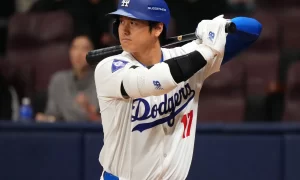1969: The Last All-Star Game in Washington

The half-life of baseball lexicon is usually pretty long. How many people still think of the Houston Astros as an NL team? What about the Brewers as an AL team? By now, most of us stopped referring to Giancarlo Stanton as “Mike”, but even though they’ve played 13 and a half seasons in Washington, it’s easy to remember the Nationals as the Expos. going back much farther, it’s a little harder to remember that the Rangers were once the Washington Senators (and so were the Twins!)
The Washington Senators
There was no baseball in Washington D.C. from 1972-2004, which means there hasn’t been an All-Star Game in our nation’s capital since it was home to a different franchise altogether. The 1969 All-Star Game was played on July 23 at RFK Stadium, home of the (new) Washington Senators. The stadium opened in 1961 as one of the first “cookie cutter” multipurpose facilities for both baseball and football.
The Senators were a punchline for the majority of both incarnations, new and old. The first version of the Senators enjoyed just 18 seasons with a winning record from 1901-1960, before moving to Minnesota. The second iteration didn’t fare much better, but in 1969 they were on their way to a respectable 86-76 record. This was the franchise’s only season above .500 before leaving for Texas in 1972.
The 1969 All-Stars
The starting lineups were as follows:
National League
- CF Matty Alou (PIT)
- SS Don Kessinger (CHC)
- RF Hank Aaron (ATL)
- 1B Willie McCovey (SFG)
- 3B Ron Santo (CHC)
- LF Cleon Jones (NYM)
- C Johnny Bench (CIN)
- 2B Felix Millan (ATL)
- P Steve Carlton (STL)
American League
- 2B Rod Carew (MIN)
- CF Reggie Jackson (OAK)
- RF Frank Robinson (BAL)
- 1B Boog Powell (BAL)
- LF Frank Howard (WAS)
- 3B Sal Bando (OAK)
- SS Rico Petrocelli (BOS)
- C Bill Freehan (DET)
- P Mel Stottlemyre (NYY)
Eight of the 18 combined starters are in the Hall of Fame. The NL also featured eight more future Hall of Famers on their bench, and the AL added three more. NL players would amass 11 MVP and 9 Cy Young awards over their careers, while the AL squad accounted for 9 MVPs and a pair of CYs (both by Denny McLain). These include 1969 MVPs McCovey and Harmon Killebrew (on the AL bench) as well as CYs Tom Seaver and McLain. Mike Cuellar shared the AL CY in 1969 with McLain, but was not selected as an All-Star. Neither were NL and AL Rookies of the Year Ted Sizemore and Lou Piniella. The hosting Senators were represented by two players: slugging left fielder Frank Howard and lefty reliever Darold Knowles.
1969 was not just any normal season in baseball. Both leagues expanded from 10 to 12 that year, necessitating a split into East and West divisions for the first time. Expansion often presents a problem for All-Star selection. There’s a controversial rule requiring every team to have at least one player on the All-Star roster. That includes expansion teams, which are always terrible and mostly consist of cast-offs from the rest of MLB.
The expansion team All-Stars of 1969 were a mixed bag. Representing the San Diego Padres was catcher Chris Cannizzaro, who hit just .220/.290/.297 that season. The Montreal Expos All-Star was the much more deserving Rusty Staub, who slashed .302/.426/.526. First baseman Don Mincher (.246/.366/.454) and outfielder Mike Hegan (.292/.427/.461, but only 95 games played) became the only players to ever wear a Seattle Pilots hat as All-Stars (the Pilots became the Milwaukee Brewers in 1970). Catcher Ellie Rodriguez (.236/.333/.296) represented the Kansas City Royals.
The Game
The AL gave away a run in the top of the first, as Alou singled, advanced to third on a ground out and a wild pitch, then scored on an error by Howard in left field. A solo homer by Bench in the second inning gave the NL a 2-0 lead, but Howard matched him with a solo shot of his own in the bottom of the inning.
The NL opened the floodgates against Blue Moon Odom in the top of the third. Aaron led off with a single, then trotted home on McCovey’s two-run bomb. Following a groundout, error, and single, Millan doubled to left plating two more runs. Carlton then doubled him home (yes, the starting pitcher came to bat!) to give the NL an 8-1 advantage.
Freehan led off the bottom of the third with a solo blast, which was neutralized by McCovey’s second homer of the game in the fourth inning. Reggie Smith cored on a Freehan single in the bottom of the fourth to bring the score to 9-3, NL. This would be the final outcome, as both teams were held scoreless during the final five innings. NL pitchers Bill Singer, Jerry Koosman, Larry Dierker, and Phil Niekro shut the door on the AL team, while AL pitchers Dave McNally, Sam McDowell, and Ray Culp did the same.
Carlton got the win and Stottlemyre the loss, while Niekro earned a save. For his 2-HR performance, McCovey collected the All-Star Game MVP award. He’s one of only six players to win the All-Star Game and regular Season MVP awards in the same year: Maury Wills (1962), Willie McCovey (1969), Steve Garvey (1974), Roger Clemens (1986), Cal Ripken (1991), and Mike Trout (2014).
With 30 teams in MLB at present, each franchise should host the All-Star Game roughly once every 30 years. In that context, it’s really not so bad that Washington went 39 years between hosting opportunities. It just happens that they didn’t have a lot of regular season baseball between All-Star Games. The last All-Star Game held in Montreal was in 1982, but they may have to wait considerably longer before the next one.
-Daniel R. Epstein














